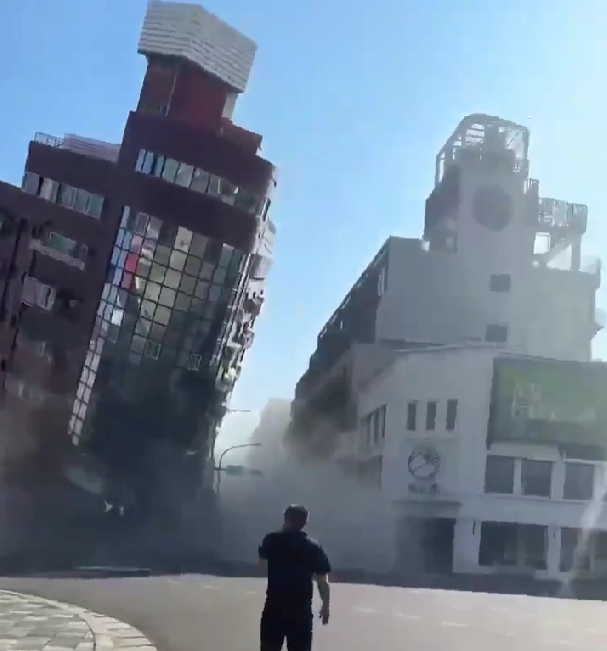Bishop: ‘closeness and care’ with the ‘peace of the Risen Jesus’ to people affected by Taiwan quake
Bishop Philip Huang Chao-ming of Hualien, near the epicentre of the 7+ quake, offers words of comfort. Some buildings are partially collapsed. Nine people are confirmed dead, while more than a hundred are still missing. For Fr Matteucig, a Taipei-based missionary, “A lot has really changed since 1999 in terms of prevention”, thus limiting damages and casualties. Mainland China has offered to help, but Taiwan said there is no need.
Taipei (AsiaNews/Agencies) – This morning, at 7:58 am, a magnitude 7.4 earth quake, the strongest in the last 25 years, rocked the island of Taiwan, with its epicentre near Hualien, a city of about 100,000 people on the country’s eastern coast, about 130 kilometres from the capital Taipei.
Reacting to the event, Bishop Philip Huang Chao-ming of Hualien said: “This morning's violent tremors caused disasters in several counties and cities, particularly in Hualien, which suffered the most damage. We hope that those most affected will be rescued quickly. Let us seek in our worries and fears the peace of the Risen Jesus. May the peace of the Lord be with us.”
In their update, Taiwanese authorities report nine dead, with 821 people injured and at least 127 still trapped under the rubble. Some of the confirmed fatalities were hikers struck by falling rocks on a trail in Taroko National Park, one victim was working at roadside maintenance site, while another was working in a mining area.
By midafternoon, Taiwan’s Central Emergency Operation Center (CEOC) had reported 28 collapsed buildings: 17 in Hualien, one in Yilan County, two in Keelung and eight in New Taipei City.
One of the structures affected in Hualien was a large building at the intersection of Zhongshan and Chongqing streets; by late afternoon, rescuers had reached everyone inside, but the last person pulled out showed no signs of life.
Meanwhile, the Diocese of Hualien “has contacted all the parishes to offer closeness and care. At the moment, except for some objects that have fallen to the floor or are damaged and in need of repair, there are no reports of serious damage,” writes Bishop Huang Chao-ming, in his message posted this afternoon on the diocesan website.
“As the aftershocks continue, parish priests, pastoral committees, and parishioners are urged to continue to remain vigilant, pay attention to safety, stay away from buildings, and seek refuge in open spaces. We remain here to pay attention to the needs and assist in the organisational work in a timely manner. May God grant you peace! God bless Taiwan!"
The quake was also strongly felt in Taipei as well, but no serious consequences have been reported at present.
“The earthquake struck when I had just reached the hotel," says Francesca Lancini, an Italian freelance journalist currently in the country.
“One of the receptionists at the front desk said, ‘It's something different, it's stronger.' So they made us all go out into the square, calmly. There was a mixture of concern but also order, because Taiwan is used to earthquakes.”
“The pictures coming from Hualien are striking,” Lancini said, “but fortunately, the earthquake does not seem to have caused huge damage like in 1999. I think it shows the important steps made since then to deal with these kinds of events.”
On 21 September 1999, Taiwan was hit by a 7.3-magnitude earthquake that killed over 2,400 people; back then, the epicentre was in Nantou County, a more central area.
“Taiwan takes earthquakes much more seriously today," explains Fr Giuseppe Matteucig. “This morning when the quake hit, I was in the subway, underground; they ordered us off and kept everything closed for at least an hour to check that everything was okay.”
The Taipei-based Xaverian missionary notes that “People are getting involved, many are helping. While aftershocks continue, people in Taipei have been told not to move, so as not to run the risk of being hit by falling tiles or billboards.
“A lot has really changed since 1999 in terms of prevention with greater awareness of being in a seismic zone. The authorities rigorously monitor things. In one of the more recent earthquakes, they had a building under construction torn down and rebuilt just in case it had suffered damage.”
“I contacted our parishioners, almost all of them answered," Fr Matteucig said. “They're afraid of shocks, but they are all fine. Now we will see how to help those who have been most affected. As always, the Catholic dioceses with Caritas will be on the front line, working with Buddhist outreach organisations.”
The earthquake was also distinctly felt in the People's Republic of China with disruptions to high-speed trains in Fujian province, but also Jiangxi, Guangdong, and Zhejiang.
The earthquake has also impacted the very delicate relationship between Beijing and Taipei. Immediately after the quake struck, the Taiwan Affairs Office of China’s State Council offered disaster assistance.
In response, Taiwan's Mainland Affairs Council issued a brief statement saying there is no need for such assistance. For her part, Taiwanese President Tsai Ing-wen said that for the government the “priority now is to save people.”







.png)










